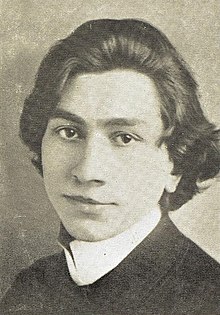Rudolf Friml


Charles Rudolf Friml
Early life
Friml was born Rudolf Antonín Frymel on December 2, 1879, in
After the conservatory, Friml took a position as
The Firefly and early operettas
One of the most popular theatrical forms in the early decades of the 20th century in
Trentini was named as a co-respondent in Friml's divorce from his first wife in 1915, and evidence was introduced that they were having an affair.[1] Another show, Sometime, written with Rida Johnson Young and starring Ed Wynn and Mae West, ran well on Broadway in 1918–1919.[9]
Success
Friml wrote his most successful operettas in the 1920s. In 1924, he wrote
After Rose-Marie's success came two other hit operettas, The Vagabond King in 1925, with lyrics by Brian Hooker and William H. Post, and The Three Musketeers in 1928, with lyrics by P. G. Wodehouse and Clifford Grey, based on Alexandre Dumas's famous swashbuckling novel. In addition, Friml contributed to the Ziegfeld Follies of 1921 and 1923.
Friml wrote music for many films during the 1930s, often songs adapted from previous work. The Vagabond King, Rose-Marie and The Firefly were all made into films and included at least some of Friml's music. His operetta version of The Three Musketeers was never filmed. In 1930, he wrote a new operetta score for film, The Lottery Bride. Like his contemporary, Ivor Novello, Friml was sometimes ridiculed for the sentimental and insubstantial nature of his compositions and was often called trite. Friml was also criticized for the old-fashioned, Old World sentiments found in his works. Friml's last stage musical was Music Hath Charms in 1934. During the 1930s, Friml's music fell out of fashion on Broadway and in Hollywood.[10]
Later years and legacy
Rather than trying to adapt to popular taste, Friml decided to focus on playing the piano in concert and composing art music, which he did into his nineties.
In 1967, Friml performed in a special concert at the
His two sons also worked as musicians. Rudolf Jr. was a big band leader in the 1930s and 1940s, and William, a son from Friml's third marriage, was a composer and arranger in Hollywood. William married Shelby Payne after her divorce from actor Douglas Fowley.[12][page needed] In 1969, Friml was celebrated by Ogden Nash on the occasion of his 90th birthday in a couplet which ended: "I trust your conclusion and mine are similar: 'Twould be a happier world if it were Frimler." Similarly, satiric songwriter Tom Lehrer made a reference to Friml on his first album, Songs by Tom Lehrer (1953). The song "The Wiener Schnitzel Waltz" includes the lyric, "Your lips were like wine (if you'll pardon the simile) / The music was lovely, and quite Rudolf Friml-y." Near the end of the 1957 musical The Music Man, Harold Hill lies to Marian Paroo: "I'm expecting a telegram from Rudy Friml, and this could be it."[13]
Friml died in
Works
|
|
Notes
- ^ a b c "Mrs. Rudolf Friml to Receive Divorce". The New York Times, July 25, 1915, p. 15
- ^ "The Catalogue". katalog.ahmp.cz. Retrieved 2020-06-01.
- ^ Everett, p. 3
- ^ Everett, p. 4
- ^ "1904 Nov 17 / Special / Damrosch", New York Philharmonic, accessed June 14, 2020
- ^ Everett, pp. 93–94
- ISBN 0-415-93704-3
- ^ Cummings, Robert. The Firefly, All Music Guide
- ISBN 0199729700
- ^ a b c Program notes, Rose Marie, Light Opera of New York, Landmark on the Park theatre, February 2012
- ^ "Rudolf Friml", Internet Movie Database, accessed July 27, 2017
- ^ McDonnell, Evelyn, Queens of Noise: The Real Story of the Runaways (2013).
- ISBN 1617746002
- ^ Vocal score for High Jinks
- ^ Vocal score for You're in Love
References
- Cambridge Guide to Theatre, 1992.
- Ceskoslovensky hudebni slovnik, vol. 1, 1963.
- Everett, William. Rudolf Friml, University of Illinois Press, 2008 ISBN 0-252-03381-7
- Green, Stanley. Broadway Musicals Show by Show, 5th Ed. Hal Leonard, New York. 1996.
- Green, Stanley. The World of Musical Comedy. Ziff-Davis, New York. 1960.
- Ganzl, Kurt. The Encyclopedia of Musical Theatre (3 Volumes). New York: Schirmer Books, 2001.
- Traubner, Richard. Operetta: A Theatrical History. Garden City, NY: Doubleday & Company, 1983.
- Bordman, Gerald. American Operetta. New York: Oxford University Press, 1981.
External links
- Works by Rudolf Friml at Project Gutenberg
- Works by or about Rudolf Friml at Internet Archive
- Rudolf Friml at the Internet Broadway Database
- Friml Archive, UCLA Performing Arts Special Collections. Manuscripts, recordings, correspondence, memorabilia (in process)
- List of Friml's stage works with information about librettists and theatres
- Rudolf Friml at Find a Grave
- Rudolf Friml at IMDb
- Free scores by Rudolf Friml at the International Music Score Library Project (IMSLP)
- Rudolf Friml recordings at the Discography of American Historical Recordings.
